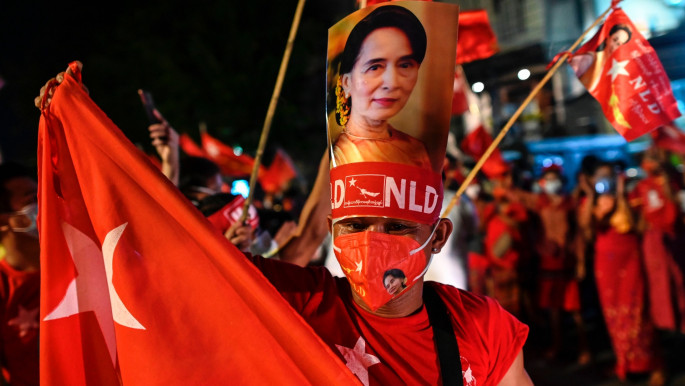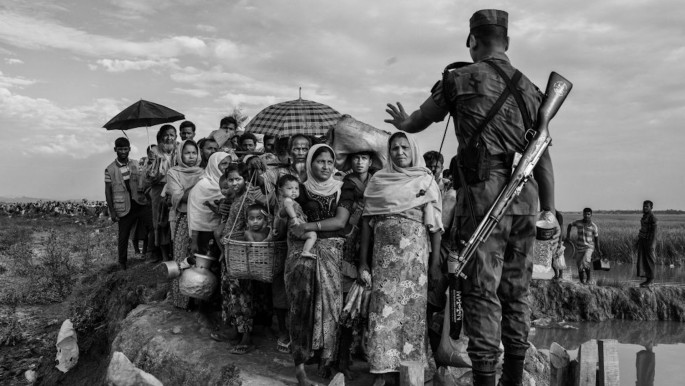The facade of Myanmar's democracy: How global powers failed Rohingya Muslims
"Part of the problem for organisations like mine is that human rights have fallen way down the international agenda. It's much harder than it has ever been for us to generate pressure and force governments to act," Mark Farmaner, director of the Burma Campaign UK, told The New Arab. Geopolitics continue to take centre stage, Farmaner says, despite the fact that a "genocide" has taken place.
The recent escalation of military violence perpetrated against pro-democracy protesters must not be ignored either, says Ana Colins, an education facilitator who previously worked with refugees from Myanmar at Cox's Bazar and in the border town of Mae Sot, Thailand.
"While the coup will make little difference to Rohingya, this blatant violence against civilians in urban areas has also not been seen since the height of the Saffron Revolution in 2007," she told The New Arab.
Lauded as the smiling face of democracy, Aung San Suu Kyi had been busy courting contrasting worlds that nearly stripped her of the Nobel Peace prize. Myanmar's now ousted leader supported EU and US funding for Myanmar's democratic process while also rejecting charges of the military's genocide at the International Court of Justice in 2019.
 |
Caught in the crossfire of toxic geopolitical dynamics, the Rohingya do not fit anywhere into the equation |  |
A similar dynamic is at play in Western powers' condemnation of Myanmar's coup and the demand for a "return to democracy", analysts say, which place economic and geopolitical priorities above mass human rights abuses.
According to Professor Azeem Ibrahim, director at the Center for Global Policy in Washington, former US president Barack Obama's vision during his 2017 visit to Myanmar was to seal his legacy as a "gate opener president." In other words: lift sanctions and keep Myanmar out of China's sphere of influence. The tens of millions in US funding for Myanmar's "democratic process" over the years have "simply been a charade to show this is a functioning democracy moving in the right direction," he said.
 |
|
| Read more: The Rohingya crisis and Myanmar's dark road to democracy |
Since 2012, the US has provided nearly $1.5bn in funding to "support Burma's democratic transition and economic transformation," while the EU has provided some €700 million. According to Ibrahim, "investing this money was a complete waste of time because you cannot have an election in which significant portions of the population are not permitted to vote."
Such funding seeks to compete against Chinese economic projects like the Belt and Road Initiative and String of Pearls Project, which are keeping Myanmar close and are enticing for countries like Pakistan, which "nobody wanted to touch with a barge pole" until China invested $62 billion, says Ibrahim.
The US has simply failed to "put its money where its mouth is," sending more countries into China's embrace. But he said such countries will also have to pay the price of becoming "part of the Beijing Project." Coup or no coup, it is simply the "veneer of democracy in Myanmar, that has now been removed."
Members of Suu Kyi's National League for Democracy (NLD) have vocalised a willingness to be imprisoned in defence of human rights yet refuse to acknowledge the persecution of the Rohingya.
 |
Real democracy in Myanmar was not necessarily important to Western powers as long as voting was taking place |  |
According to Ibrahim, Suu Kyi's own attitude towards the Rohingya did not arise from fear of the military, as many allege. "I've met people who had interactions with her and when they've brought up the case of the Rohingya, she just explodes in a fit of anger. That's not characteristic of somebody that's got a gun to the head."
Real democracy in Myanmar was "not necessarily important to Western powers as long as voting was taking place," Ibrahim said, because it gave the green light to trade and financial relations. "It meant they could say we don't need sanctions and we should continue to trade - that's what the millions of dollars pay for."
The EU in particular, he said, has been driven by economic concerns. "There's been lots of talks at the EU level about Myanmar's democratic mandate and human rights. But if you look at the substance, they [the EU] are actually significantly worse than any other Western entity; worse than the UK, and much worse than the US."
This dynamic is reflected by the EU-China trade deal, pushed through despite human rights violations committed against Uighur Muslims. Caught in the crossfire of toxic geopolitical dynamics, Ibrahim says the Rohingya "do not fit anywhere into the equation".
And with China's economic and military protection of Myanmar "there is little the international community can do." He said it was "unlikely" to happen, but if there is a country with the clout to bring an end to the persecution of the Rohingya, it could be China.
 |
|
| Read more: What Myanmar's coup means for the future of Rohingya Muslims |
To date, Chinese efforts to mediate between Myanmar and the Rohingya with panel discussions and dialogues have been fruitless. But Ibrahim said China's non-interference policy meant such efforts were not serious enough. "You can interfere and remain neutral but by not interfering in this genocide, you are by definition, supporting it by being silent."
Beyond these contemporary geopolitical dynamics, Professor of Global Thought at SOAS, Arshin Adib-Moghaddam, argues that it is critical to acknowledge the historical repercussions of colonialism after Britain's annexation of large areas like Rakhine State.
"There is a historical factor here: the imperial delineation of the region by the British as a part of the decolonisation of India; its bloody period of partition; and the momentous historical dilemmas this brutal period of human history engendered," he told The New Arab.
"Like so many other communities the Rohingya were used as pawns on the imperial chessboard. They cooperated with the British in the hope of achieving some sort of autonomy or independence. When the British forces departed, the Rohingya were left behind defenceless against retribution and came to be seen as a fifth column in Burma."
 |
Like so many other communities, the Rohingya were used as pawns on the imperial chessboard. They cooperated with the British in the hope of achieving some sort of autonomy or independence |  |
According to Omair Anas, an assistant professor at Yildirim Beyazit University, Ankara, this historical legacy could have been avoided had power structures such as the UN Security Council taken responsibility.
"The UNSC was created before the independence of most of the Asian colonies. The right of citizenship of the people living in these colonies should be the subject of the UNSC and its constituent colonial members, the UK, in this case," he told The New Arab. He said Muslims in the region who worked for the British as labourers should have been offered the same rights to British citizenship as the Indian community after their expulsion from Uganda in the 1970s.
 |
|
| Read more: The Torture in My Mind: Powerful photographs depict the Rohingya mental health crisis |
He said the British "were fully aware" of the fate awaiting their Rohingya allies when they left them in Burma without settling the dispute between the Burmese and Rakhines. They could also have settled this by making Rakhine part of the Bengal residency, then known as East Pakistan.
The recent military coup "must be seen in the context of increasing competition between China and the US for the Indo-Pacific Ocean," Anas said. It can also be seen as a "pre-emptive step" taken by China to "keep India and the US busy in the Myanmar crisis" after the Biden administration's military alliance with India in its stance against China.
"The coup is perfectly at the behest of China because it will also seek to block India's East Asia policy before the Biden administration's Asia Pacific offensive."
Other analysts like Ibrahim say we will never really know the extent of China's role in the coup. However, for the military, the NLD's election victory may have set off alarm bells about the party's capacity to be "extremely influential". The NLD's emphatic election victory may have also made military general Min Aung Hlaing vulnerable to ICJ prosecution, threatening to jeopardise his family's interests and wealth.
In the meantime, the Rohingya Muslim minority is trapped at the nexus of complex geopolitical dynamics in which they have been failed by international powers, whether by China's non-interference, UK arms sales to Myanmar, EU and US funding for the country's democratic process, or the historic failure of colonial powers to protect minority groups under their rule.
Anu Shukla is a freelance journalist based in London. Follow her on Twitter: @AnuShuklaWrites





 Follow the Middle East's top stories in English at The New Arab on Google News
Follow the Middle East's top stories in English at The New Arab on Google News


